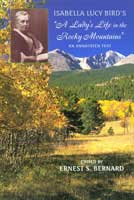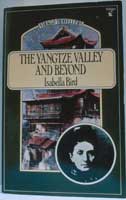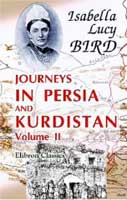Isabella Lucy Bird - Its a Woman’s right to do what she can do well
Isabella was brought up in the North of England and educated to a high standard at home. She suffered general ill health, in particular a spinal complaint. Her father encouraged her independence.
 The first of her journeys was at his instigation. To recover from an unrequited love affair in 1854 she was sent to America with some cousins. She soon left them and learnt to travel light and to travel alone. She wrote two books on what she saw there.
The first of her journeys was at his instigation. To recover from an unrequited love affair in 1854 she was sent to America with some cousins. She soon left them and learnt to travel light and to travel alone. She wrote two books on what she saw there.
In 1860 her father died and the family moved to Edinburgh. From here she made several excursions to the Outer Hebrides, where she wrote about what she saw, and indeed any subject that took her interest. She still suffered from back trouble, insomnia and depression until the age of forty when she set off for Australia, continuing to Hawaii when her health miraculously improved. The pattern stayed with her - ill at home and well abroad for the rest of her life.
 In 1873 she travelled to the Rocky mountains. She later went to Japan and Malaya. In 1881 she married Dr John Bishop, but he died in 1886. Three years later she set off on travels to Tibet and Lakdah, Persia, Kurdistan and Korea and the remote interior of China. In 1901 she made her final journey - to Morocco. She died in 1904 in Edinburgh.
In 1873 she travelled to the Rocky mountains. She later went to Japan and Malaya. In 1881 she married Dr John Bishop, but he died in 1886. Three years later she set off on travels to Tibet and Lakdah, Persia, Kurdistan and Korea and the remote interior of China. In 1901 she made her final journey - to Morocco. She died in 1904 in Edinburgh.
She always wanted to know more of the habits and customs of the peoples she visited. She insisted in writing her diary every day regardless of tiredness. When she returned home she would transform these into a text of a book. Because it was ‘in the field’ her writing had a zest and immediacy to it unusual for the time.
Her books were very popular and she was encouraged to lecture on her travels, soon becoming a familiar figure at the Royal Geographical Society and British Association. In 1891 her knowledge of Armenia caused her to be called to the House of Commons to answer questions, where she enthralled those present.
 Wherever she went she sought out the British living there to gain a specialist knowledge of where she was travelling through. Her skills as a negotiator and her determination carried her through crises, but she did know that behind her was the power of the British Empire. People joined her caravan for the protection it afforded, but she was a good emissary for the British, being firm but not aggressive.
Wherever she went she sought out the British living there to gain a specialist knowledge of where she was travelling through. Her skills as a negotiator and her determination carried her through crises, but she did know that behind her was the power of the British Empire. People joined her caravan for the protection it afforded, but she was a good emissary for the British, being firm but not aggressive.
Source - Isabella Lucy Bird 1831-1904 A Biography of an intrepid traveller by Olive Checkland
link to wikipedia on Isabella Bird
